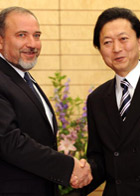Shalom Japan

Israel's Foreign Minister Avigdor Lieberman is in Tokyo this week for meetings with Japanese Prime Minister Yukio Hatoyama and Foreign Minister Katsuya Okada. Lieberman is seeking more robust Japanese pressure on Iran to halt its quest for nuclear weapons. His arrival follows a visit only last month by deputy premier Dan Meridor, who is responsible for intelligence matters.
Lieberman's other main goal will be strengthening the economic ties between Israel and Japan, which have blossomed since the 1993 Oslo Accords and the weakening of the Arab boycott. At $3.4 billion worth of business annually, Japan is second only to China as Israel's biggest East Asian trading partner. (By contrast, Japanese trade with Iran, mostly crude oil, stands at about $14 billion a year. )
Japan's attitude toward the Palestinian-Israel conflict parallels that of many EU countries. This year, Tokyo backed Israel's admission to the OECD in the face of strenuous opposition by the Palestinian lobby. It also condemned a recent rocket attack from Gaza that claimed the life of a foreign worker in Israel. More categorically, however, it has "deplored" Israeli plans for housing over the Green Line and, like the EU, funneled millions of aid dollars to the Palestinian Authority.
Sentiment among the Japanese intelligentsia also mimics European thinking. The country's largest conservative newspaper, Yomiuri, recently expressed sympathy with the Arab view that it was hypocritical to focus on Iran's nuclear program when Israel remains a non-signatory to the Nuclear Non-Proliferation Treaty. Culturally, philo-Semitism has long coexisted with anti-Semitism in the Japanese imagination. Some trace the former phenomenon to a 19th-century Scottish missionary who promulgated the notion that the Japanese were descendants of the biblical Ten Lost Tribes. As for the latter, the anti-Semitic Protocols of the Elders of Zion made its way to Japan after World War I, further bewildering a society that had little exposure to Jewish civilization. More recently, the Aum Shinrikyo cult, prior to releasing deadly sarin gas in the Tokyo subway in 1995, published a tract declaring war on the Jews. Holocaust denial and other anti-Semitic tropes have had their airing.
Would greater personal contact benefit mutual understanding? Although tourism is hampered by the absence of direct flights, increasing numbers of Japanese tourists, including Christian Zionists, have been visiting Israel. The Japanese embassy is working with the Hebrew University to introduce Japanese society to Israeli high-school students, and a parallel program in Japan would no doubt be equally beneficial. In the meantime, it may gratify some to know that the Israeli pop group Hadag Nahash was warmly welcomed in Japan last year.
Comments are closed for this article.




